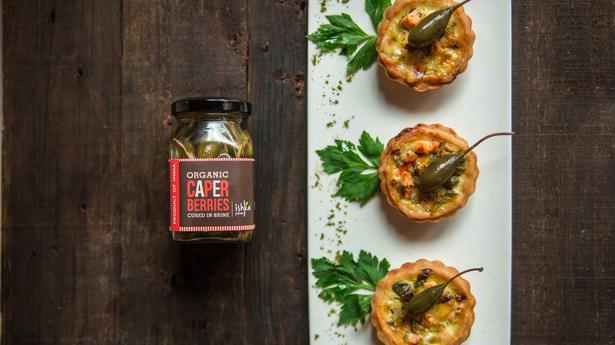
Behind India’s only caper farm
The Hindu
In an arid corner of Tamil Nadu is a farm growing capers that leading chefs now prefer to most imported varieties
As flights to Thoothukudi, Tamil Nadu, descend to the airport, passengers by the window seat may get a glimpse of a farm with rows of glistening silver sheets. On land, the journey to the farm is through acres of arid land that in the height of summer crack into deep fissures. But it is this hostile environment that is perfect for raising capers, the little flower buds that have long garnished Mediterranean and Italian cuisine.
For Srikant Suryanarayan and Fiona Arakal, this harsh landscape is home to Ishka Renewable Farms which they started in 2012. A parcel of 365 acres of fallow land is now producing organic capers that are not just being exported but are on the racks of high-end department stores and in the kitchens of world-class restaurants. They began selling their produce in batches in 2018.
ALSO READ Finding capers in Thoothukudi
It was no mean task for the couple. An initial investment of more than ₹5 crore was used to buy the land outright and to clean it. A thick cover of the all-pervasive seemai karuvelam or Prosopis juliflora had to be removed and the earth ploughed.
“My idea of a lush green farm with a gurgling stream was shattered when I first saw this land,” laughs Arakal. The couple, through sheer grit, turned the landscape into the only caper farm in India that is organic and also adheres to good agricultural and manufacturing practices.
Various varieties of trees, both flowering and non-flowering, act as boundaries to the farm. In some portions, agathi keerai (a kind of greens) is being grown, and in some, moringa trees. And now in the midst of trees and shrubs are rows of hardy caper shrubs. The mulch films help in curbing weeds and also in conserving water: drip irrigation is practised here. Though a native version of this plant, known as kher, thrives in the harsh climes of Rajasthan, at Ishka farms, the first batch of capers came all the way from Argentina and Australia after a long tangle with red tape.
Propagated through tissue culture, all parts of this hardy shrub have uses. The tightly packed buds are filled with a piquant flavour that seeps out when brined. Left to grow, these buds burst into dainty white flowers sprouting many stamens and a long single stigma, which eventually bears the caperberry. The leaves and flowers also release a sharp flavour when cured. The roots are believed to have medicinal properties, which in Siddha medicine are used to cure liver disease.





















 Run 3 Space | Play Space Running Game
Run 3 Space | Play Space Running Game Traffic Jam 3D | Online Racing Game
Traffic Jam 3D | Online Racing Game Duck Hunt | Play Old Classic Game
Duck Hunt | Play Old Classic Game











